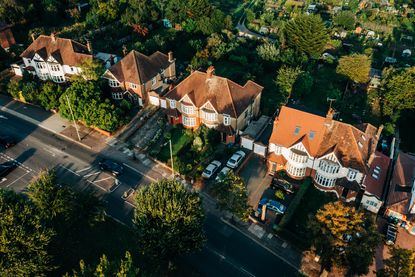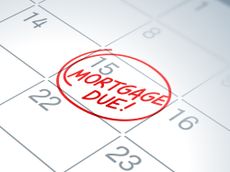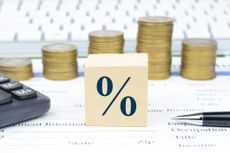Biggest house prices drop in a decade, says Nationwide
House prices have dropped for six straight months, but are they any more affordable?


House ownership could be becoming more affordable for many buyers across the country after house prices saw their biggest annual fall since 2012.
That’s according to the latest house price index from Nationwide Building Society, which found the latest UK house prices dropped by 0.5% in February.
It follows a 0.6% drop in January and means that house prices have fallen for six straight months.
What’s more, according to Nationwide in the year to February average house prices have fallen by 1.1%.
It’s the first time that the annual rate has recorded a decline since 2020, while the size of that drop is the largest reported by Nationwide since 2012.
Why house prices are falling
So, why have house prices dropped for six consecutive months?
Robert Gardner, chief economist at Nationwide, points out: “The recent run of weak house price data began with the financial market turbulence in response to the mini-Budget at the end of September last year.”
Look After My Bills Newsletter
Get the best money-saving tips, tricks and deals sent straight to your inbox every week. Make sense of your money in partnership with The Money Edit.
Essentially, the mini-Budget was so poorly received by the financial markets that it has had an enormous impact on the housing market. The expectation that the Bank of England would have to make large increases to the bank base rate led to mortgage lenders across the board pulling their entire mortgage ranges ‒ often with little to no notice ‒ and replacing them with deals which were set at much higher interest rates.
Understandably, given the general uncertainty around at that point, plenty of would-be homebuyers decided to put their plans on hold.
This is borne out by new data from the Bank of England, which found that the number of approvals for mortgages dropped for the fifth straight month in January.
And because of that lack of demand, home sellers have found it harder to find a buyer for their property, which in some cases means accepting a lower price.
In fact, data from Zoopla out this week found that sellers are currently having to accept a 4.5% discount from the asking price ‒ which in cash terms works out at about £14,100 ‒ in order to complete sales currently.
That’s the biggest gap from the asking price that Zoopla has recorded in the last five years, and works out at around a third of the house price gains seen since the start of the pandemic.
Richard Donnell, executive director at Zoopla, said that vendors were showing “greater realism”, recognising the impact of higher borrowing costs on potential buyers.
He continued: “Many homeowners are sitting on sizable house price gains made over recent years and have more room to be flexible, accepting offers below the asking price.”
What next for house prices?
So should we expect further house price falls in the months ahead?
While the mini-Budget reaction led to big increases in interest rates charged on mortgages, they have since dropped down to lower levels.
Despite this, Gardner notes that mortgage rates remain significantly higher than the lows recorded in 2021, while household finances are under ever greater strain due to the persistently high rate of inflation.
He continued: “In addition, deposit requirements remain prohibitively high for many and saving for a deposit remains a struggle given the rising cost of living, especially for those in the private rented sector, where rents have been rising strongly.”
As a result, it seems likely that there will be further house price falls ahead. Myron Jobson, senior personal finance analyst at Interactive Investor, suggests that a “significant psychological shift” is taking place, favouring prospective buyers who have been biding their time in the hope of making the sums add up.
He said: “The recent fall in house prices suggests that we are on the cusp of seeing the sales market handing back purchasing power to buyers.”
That’s in stark contrast to recent years, where the imbalance between housing stock and buyer demand has led to mammoth house price increases.
More on house prices and mortgages
- How are mortgage payments calculated?
- Mortgage borrowing calculator: how to work out what mortgage you can afford
- Help for first-time buyers
- What are the costs of buying a house?
- What is the process of buying a house? From offer to completion
- How much deposit do you need to buy a house?
- House selling costs and process explained

John Fitzsimons has been writing about finance since 2007, and is a former editor of Mortgage Solutions and loveMONEY. Since going freelance in 2016 he has written for publications including The Sunday Times, The Mirror, The Sun, The Daily Mail and Forbes, and is committed to helping readers make more informed decisions about their money.
-
 Three energy firms pay £8m in switching compensation - has your provider paid out?
Three energy firms pay £8m in switching compensation - has your provider paid out?More than 100,000 customers have received compensation after changing providers, but is now a good time to switch energy suppliers?
By Tom Higgins Published
-
 Save £300 on your supermarket shop with cashback accounts
Save £300 on your supermarket shop with cashback accountsBanks, credit card companies and cashback sites are all offering cashback on your supermarket shop, but can you use them all to max out your savings?
By Vaishali Varu Published
-
 Moving home: why failing to share your new address could cost you money
Moving home: why failing to share your new address could cost you moneyWhen you move home you’ll want to share your new address with family and friends – but being slow to update your contact details with councils, banks and the DVLA can be costly
By Sue Hayward Published
-
 Skipton Building Society to offer deposit-free mortgages for “trapped renters” - everything you need to know about 100% deals
Skipton Building Society to offer deposit-free mortgages for “trapped renters” - everything you need to know about 100% dealsEverything you need to know about how to get a mortgage with no deposit
By Katie Binns Published
-
 Stamp duty: are you entitled to a tax refund worth thousands?
Stamp duty: are you entitled to a tax refund worth thousands?There are plenty of reasons why homebuyers may be entitled to a stamp duty refund, but it’s important to only claim if you’re eligible for a refund (and beware the claims management companies)
By John Fitzsimons Published
-
 House price hotspots: 50 areas where property prices have shot up the most
House price hotspots: 50 areas where property prices have shot up the mostWhich areas have seen the strongest house price growth over the past decade? Discover the towns and locations around the UK where property prices have more than doubled.
By John Fitzsimons Published
-
 Faster mortgage support for Universal Credit claimants – what it means for you
Faster mortgage support for Universal Credit claimants – what it means for youIf you claim Universal Credit, you can now get quicker support with paying your mortgage. We look at when you can get it and how to access it
By Stephanie Baxter Published
-
 Should I fix my mortgage rate?
Should I fix my mortgage rate?Interest rates are expected to rise again on the back of stubborn inflation, before falling next year. We look at the pros and cons of fixing your mortgage rate and what to consider if you need to remortgage soon.
By Stephanie Baxter Last updated
-
 Selling your home: avoid these mistakes to get the best possible price
Selling your home: avoid these mistakes to get the best possible priceFrom boosting kerb appeal to clearing clutter, there are crucial steps to take to ensure you get the highest price when selling your home
By John Fitzsimons Last updated
-
 Interest rates rise to 4.25% - what does it mean for your money?
Interest rates rise to 4.25% - what does it mean for your money?The Bank of England has increased the base rate for the 11th time in a row. We look at whether rates could rise further this year, and what the latest hike means for your mortgage and savings
By Ruth Emery Published